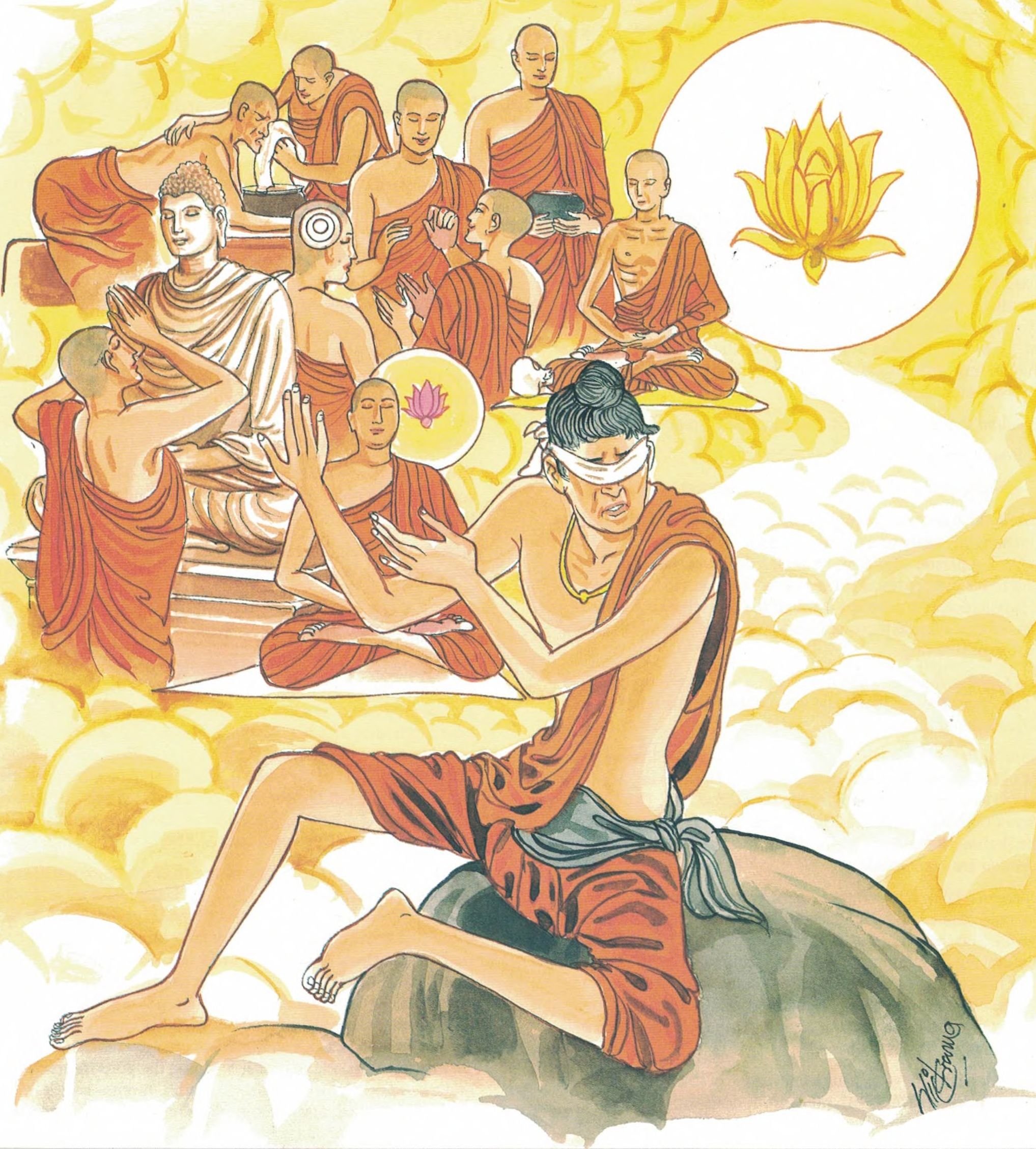Dhammapada (Illustrated)
by Ven. Weagoda Sarada Maha Thero | 1993 | 341,201 words | ISBN-10: 9810049382 | ISBN-13: 9789810049386
This page describes The Story of Venerable Tissa the Idle One which is verse 280 of the English translation of the Dhammapada which forms a part of the Sutta Pitaka of the Buddhist canon of literature. Presenting the fundamental basics of the Buddhist way of life, the Dhammapada is a collection of 423 stanzas. This verse 280 is part of the Magga Vagga (The Path) and the moral of the story is “Unenterprising, youthful but lazy, irresolute and weak, fail in their way to wisdom”.
Verse 280 - The Story of Venerable Tissa the Idle One
Pali text, illustration and English translation of Dhammapada verse 280:
uṭṭhānakālamhi anuṭṭhahāno yuvā balī ālasiyaṃ upeto |
saṃsanna saṅkappamano kusīto paññāya maggaṃ alaso na vindati || 280 ||
280. Though time to strive, not striving, while young and strong yet indolent, weak-minded and irresolute: one finds not wisdom’s way.
 Unenterprising, youthful but lazy, irresolute and weak, fail in their way to wisdom. |
The Story of Venerable Tissa the Idle One
While residing at the Jetavana Monastery, the Buddha spoke this verse with reference to Tissa, a lazy monk.
Once, many young men were admitted into the Sangha by the Buddha in Sāvatthi. After receiving a meditation topic from the Buddha, all the new monks except one went to the forest to practice meditation. They practiced zealously and vigilantly so that in due course all of them attained arahatship. When they returned to the monastery to pay homage to him, the Buddha was very pleased and satisfied with their achievement. Monk Tissa who stayed behind did not try hard and therefore achieved nothing.
When Tissa found that the relationship between the Buddha and those monks was very cordial and intimate, he felt rather neglected, and regretted that he had wasted all that time. So he resolved to practice meditation throughout the night. As he was walking in meditation on that night, he slipped and broke a thigh bone. Other monks hearing his cry went to help him. On hearing about the above incident the Buddha said, “Monks, one who does not strive when he should be striving but idles away his time will not attain mental absorption (jhāna) and magga insight.”
Explanatory Translation (Verse 280)
uṭṭhānakālamhi anuṭṭahāno yuvā balī ālasiyaṃ upeto,
saṃsanna saṅkappamano kusīto alaso paññāya maggaṃ na vindati
uṭṭhānakālamhi: when an effort is due; anuṭṭhahāno [anuṭṭhahāna]: does not make the effort; yuvā: (though) young; balī: (though) strong; ālasiyaṃ upeto [upeta]: (if) lethargic; saṃsanna saṅkappamano [saṅkappamana]: if good thoughts are suppressed; kusīto [kusīta]: lazy; alaso [alasa]: indolent; paññāya maggaṃ [magga]: the path of wisdom; na vindati: does not find
If an individual does not make an effort even at a time when exertion is due, if a person is lethargic even when he is young and strong, if a person suppresses the wholesome thoughts that arise in his mind, if he is lazy, he will not find the path to wisdom.
Commentary and exegetical material (Verse 280)
paññāya maggaṃ: the path that has to be discerned through wisdom.
paññā: understanding, knowledge, wisdom, insight, comprises a very wide field. The specific Buddhist knowledge or wisdom, however, as part of the noble eight-fold path to deliverance, is insight, i.e., that intuitive knowledge which brings about the four stages of holiness and the realization of Nibbāna and which consists in the penetration of the impermanency, misery and impersonality of all forms of existence.
With regard to the condition of its arising one distinguishes three kinds of knowledge: knowledge based on thinking (cintā-maya-paññā), knowledge based on learning (suta-maya-paññā), and knowledge based on mental development (bhāvanā-maya-paññā).
Based on thinking is that knowledge which one has acquired through one’s own thinking, without having learnt it from others. Based on learning is that knowledge which one has heard from others and thus acquired through learning. Based on mental development is that knowledge which one has acquired through mental development in this or that way, and which has reached the stage of full concentration.
Wisdom is one of the five mental faculties, one of the three kinds of training, and one of the perfections.
